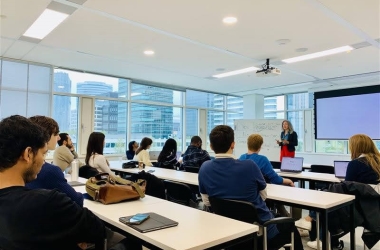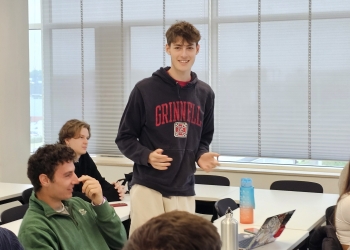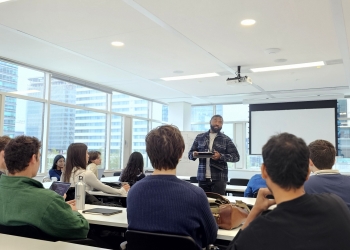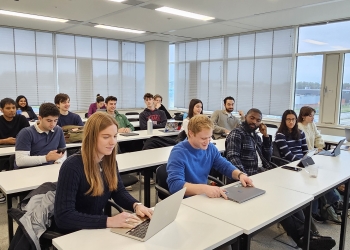Wittenborg and IES Abroad Students Debate: Should the Government Regulate Social Media?
Wittenborg and IES Abroad Students Debate: Should the Government Regulate Social Media?

Wittenborg and IES Abroad Students Debate: Should the Government Regulate Social Media?
Exploring Social Media Regulation: Perspectives from Wittenborg and IES Abroad Students
Wittenborg students, together with participants from IES Abroad, a global provider of study and internship programmes, recently gathered for a debate on one of today’s most pressing issues: Should the government regulate social media? The debate, held at Wittenborg’s Amsterdam study location and moderated by senior lecturer Amy Abdou, allowed students to explore different perspectives on freedom of speech, disinformation, and the role of government.
The debate featured three positions: support for regulation, opposition to it, and a compromise approach. Each stance brought fresh insights into how to tackle the growing challenges posed by social media.
Abdou explained that the topic was chosen by the students themselves. “This year I let the students choose a topic that was close to their interests. We collectively mapped out surrounding issues like freedom of speech, government accountability, disinformation, and the threat of criminal networks using social media,” she said.
“One student remarked that free speech is a luxury for people who don’t need it,” Abdou recalled, adding that this sparked an engaging discussion among participants.
Michael Olufade, a Wittenborg EBA (Entrepreneurial Business Administration) student, shared his thoughts on the debate: “The debate was centred around the impact of social media, including how it influences elections. That led to the question of whether government regulation is the right step. Most people looked at the situation through the lenses of their individual countries, which opened up discussions that others hadn’t considered.”
Olufade noted that the three stances created a well-rounded discussion. “Those opposed to regulation argued that governmental control could limit freedom of speech, even if it also allows hate speech. Meanwhile, those in favour clarified that they didn’t want complete government control, which led to the compromise stance - my position - that a collaborative effort is best.”
He emphasised the need for balance, stating: “Full power in the hands of social media companies would likely prioritise profit, while government control could lead to suppression. A middle ground is necessary.”
Takeaways from the debate
Reflecting on the event, Abdou was impressed by the students’ ability to engage with opposing viewpoints. “One of the hardest things to teach is how to discuss different opinions respectfully and constructively. Our students did an admirable job of presenting their arguments clearly and calmly,” she said.
Olufade added: “My key takeaway is that as we advance, there’s more need for collaboration. More conversations between people of differing opinions and ideologies are needed. It’s challenging, but necessary.”
WUP 17/10/2024
by Erene Roux
©WUAS Press



446 words